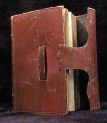|
|
 |
 |
|
Reading Guide |
| 4. |
Constitution of the American Bible Society, 1816, excerpts
|
|
 1841 Bible distributed by the American Bible Society |
After the Revolution, the western frontier was finally open to settlement, and Americans headed down the Ohio and over the Appalachians in a fevered rush of optimism and ingenuousness. Some people back East feared that the pioneers' fervor for religion might suffer from the isolation and self-determination that defined the wilderness. To address this concern, the American Bible Society was formed in 1816 to distribute printing plates for producing low-cost Bibles throughout the frontier. It was typical of many volunteer associations of the time, determined to direct the pliable new nation toward its vision of greatness. Paralleling this mission, the Society strove to counter the threat of rationalism to "seduce mankind" away from truth. Thus this text gives us a transition from the rationalism of the revolutionary leaders to the evangelicalism that came to flourish in the newly settled west. Valuable short document to use with students. 2 pages.
Discussion questions
| · |
To the Society, how will physical expansion endanger the spiritual health of the new nation?
|
| · |
How will rationalist thinking endanger its spiritual health? |
| · |
In what ways does the Society hope to counter these dangers? |
| · |
Despite these dangers, what gives the Society its enthused faith in the nation's future? |
| · |
What unifies the Society's members despite their political differences? |
| · |
Which revolutionary leaders might have supported the Society? For what reasons? |
| · |
In what ways is the Society definably "American"?
|
» Link |
 |
 |
Topic Framing Questions
| • |
How was religious freedom defined in the new republic? |
| • |
How did rationalists and evangelicals differ on the place of religion in a republic? How did they agree? |
| • |
How did diverse religious communities contribute to a shared national identity? |
| • |
How could church-state separation co-exist with the conviction that religion is critical to a nation's strength?
|
|
|
 |
 |
|
 |
